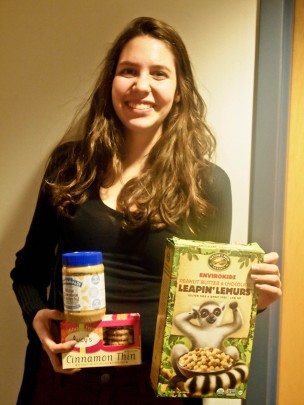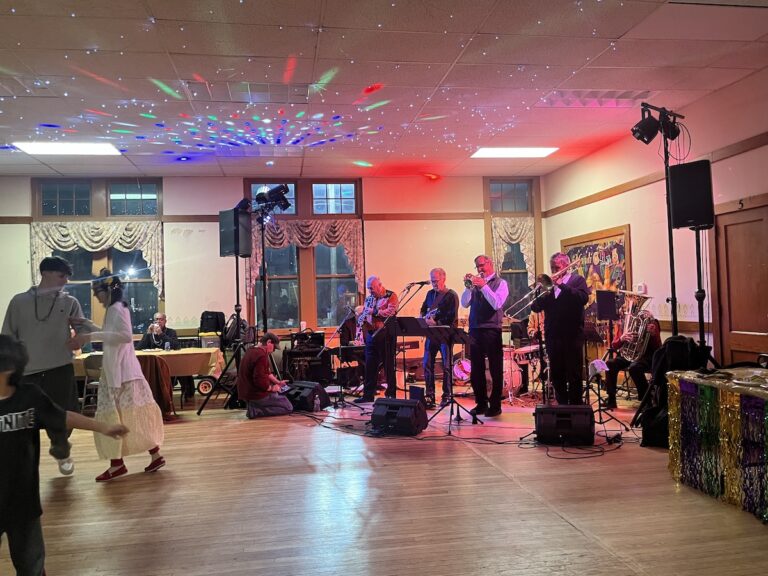There’s a Group Educating Wesleyan about Gluten-Free Issues? SWAG.

When most students walk into Usdan, they see the bountiful offerings of all the stations before deciding what appeals to their taste buds and stomachs. However, for a select group of students, entering Usdan means bouncing around from station to station, searching for the little colored circles on the menus that indicate food items that won’t make them ill.
These students suffer from either celiac disease or gluten-intolerance, meaning that their bodies cannot process food that contains gluten, or otherwise choose to eat gluten-free. To increase awareness of the gluten-free diet and its benefits, discuss the challenges of a gluten-free diet, and work to overcome those challenges, Rachel Sobelsohn ’17 and Zach Carfi ’17 founded Students at Wesleyan Avoiding Gluten (SWAG).
“SWAG aims to educate members of the Wesleyan community regarding the gluten-free diet and its benefits,” Sobelsohn wrote on the club’s OrgSync profile. “This includes the risks of cross-contamination, challenges students face, and proactive ways to stay strictly on the gluten-free diet. We want to do this in a fun, engaging way so we will be baking and sharing gluten-free products. SWAG will create a support network of students (who want to learn more about the gluten-free diet, want to go gluten-free, or are already gluten-free) and share recipes, food, complaints and ideas.”
During its meetings, which are held on Wednesdays at 8 p.m. in 41 Wyllys room 113, the club discusses gluten-free issues, eats gluten-free cookies, and makes posters to raise awareness about the gluten-free community at the University. SWAG is currently pursuing funding for gluten-free baking supplies so the group can host baking events and dinners.
One of SWAG’s goals is to create an online mini-series detailing gluten-free issues pertinent to college students. Though, according to Sobelsohn, most gluten-free related mini-series thus far typically state the challenges and ask for pity, Sobelsohn said she hopes the new mini-series will be interesting and engaging.
“We want to reach a large community, and there’s a huge market for a gluten-free college mini-series,” she said.
One issue that gluten-free students at Wesleyan have is that in the salad bar, the pasta is often put behind the vegetables.
“People have to reach over the vegetables to get to the pasta, and sometimes the gluten pasta falls into the salad,” Carfi said. “It is poorly arranged.”
Additionally, while the gluten-free station is set aside from the others, it is still open to all students. Occasionally, students will bring their food that contains gluten into the gluten-free station, which can cause unintentional contamination.
“A lot of people don’t understand that if they touch their food and then touch our food, we will get sick,” Carfi said.
This is especially a problem with the waffle iron, because non-gluten-free batter is sometimes poured into the gluten-free iron. Once gluten makes contact with the porous iron surface, it is nearly impossible to remove all of it, and a new iron must be purchased, Carfi explained.
Sobelsohn was diagnosed with celiac disease in fifth grade, but she didn’t eat gluten-free foods because she didn’t like how they tasted.
“I looked sick, weak, and thin and had a lot of stomach aches before I started keeping a strict gluten-free diet,” she said. “Then I grew six inches in four years after being gluten-free.”
She said that when she was applying to colleges last year, she looked into which ones had the best gluten-free dining options, both on and off campus.
“The Wesleyan dining staff seemed really knowledgeable and Middletown seemed to have very good gluten-free options,” Sobelsohn noted after reading an article dedicated to gluten-free eating on WesStuffed.
During her first two weeks on campus, Sobelsohn went from station to station at Usdan, eating only the dishes with the gluten-free label on the menu. However, she had a constant stomachache.
“I am more sensitive than anyone I know, and my symptoms are more severe,” Sobelsohn said. “I need to be close to one hundred percent gluten free.”
She eventually met with Usdan Director Michelle Myers-Brown, University Medical Director Thomas McLarney, Bon Appétit Resident District Manager Michael Strumpf, Bon Appétit Dietician Daniele Rossner, and Associate Dean of Student Academic Resources Laura Patey to discuss solutions.
“I realized that it’s on me to be proactive,” Sobelsohn said. “It’s a dialogue I needed to start.”
Now, a few hours before each meal, a Bon Appétit employee emails Sobelsohn with that meal’s gluten-free menu, and Sobelsohn responds with her choices. When she arrives in Usdan, she receives plates of food that were cooked with the rest of the gluten-free offerings but Saran-wrapped and put aside to prevent cross-contamination. This is a unique arrangement, because most students who have celiac or are gluten-intolerant or gluten-sensitive do not get sick after eating the normally designated gluten-free dishes.
“It still isn’t perfect, but I’m dealing with what I have,” Sobelsohn said. “Wesleyan is definitely one of the top gluten-free schools. They’ve been really accommodating about everything.”
Carfi was diagnosed with gluten intolerance three years ago, after suffering from stomach issues and then having his blood tested. According to Carfi, although it is not as severe as celiac disease, his gluten intolerance means that his body cannot digest gluten.
Maya Stevens ’17, who is gluten-intolerant and has been gluten-free for a little over a year, said she was very excited to join SWAG and to meet other students who were also dealing with the difficulties of a gluten-free lifestyle.
“I wasn’t sure what to expect upon joining, but now that we’ve met a couple times and have talked about things we can do to make eating gluten-free, without risk, at Wesleyan easier, I’m excited to see how we can fix these problems,” she said. “Hopefully, we can make people more aware that this allergy is legitimate and not all that uncommon and make people conscious of how their actions in the dining halls might affect us. That might take some time, though.”
Upon arriving at Wesleyan, Stevens said she was pleasantly surprised by how accommodating the University is to the gluten-free diet. Unlike at home, where Stevens found that people were not as aware of gluten-free dietary limitations, in Usdan, gluten-free stickers and the gluten-free station allow Stevens more flexibility in her eating.
“It makes my life a lot easier, but the system isn’t perfect,” she said. “There are a lot of smaller things that could be fixed, but in general, there are some pretty rare days where there isn’t enough gluten-free food available for a full meal, so I’ve started checking the menus religiously to make sure there are things I can eat. And the gluten-free station is still pretty limited.”
Since she joined SWAG and learned about the struggles of her gluten-free peers, Stevens has become more conscious of her diet. She is less sensitive than people with celiac, so if she accidentally gets a few crumbs or pasta from the salad bar in her food, her body’s reaction is mild.
“I hadn’t even noticed that [cross-contamination in Usdan] was a problem even though I’m gluten-free, but now [that I joined SWAG] I’m a lot more careful about it,” she said.
In accordance with SWAG’s mission to educate the University community on gluten-free issues, Stevens offered advice and suggestions for how students can make the school safer for people who cannot process gluten.
“It’s the little things that make the most difference, honestly, and a lot of these problems can be solved with really simple precautions,” she said. “Try to keep food with gluten out of the gluten-free station; don’t touch anything in there if you’ve touched food with gluten; don’t use the equipment in there with foods that aren’t gluten-free. And outside the station, just try to keep crumbs or pasta bits from getting into the foods around Usdan that wouldn’t normally have gluten.”
Meghan Waitzer ’17, who is an ally to the gluten-free members of SWAG, expressed that having a gluten-free diet is not a choice or a fad for most students; rather, it is often a legitimate health concern.
“You wouldn’t question someone with a peanut allergy, so why question someone who is gluten-free?” she said.







Leave a Reply